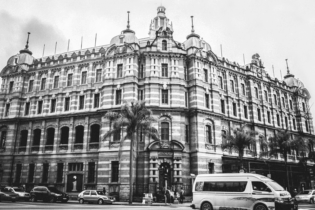Maersk Mc-Kinney Moeller, longtime shipping magnate, dies at 98
Maersk Mc-Kinney Moeller, an immensely rich and powerful Danish businessmen who transformed his family’s shipping company into the world’s largest, died on Monday in Copenhagen. He was 98. The A. P. Moeller-Maersk Group, the conglomerate he led, announced the death. Joining the company before World War II, Mr. Mc-Kinney Moeller oversaw its growth into a company that handled 15 percent of the world’s manufactured goods shipped by sea, according to industry estimates. He was instrumental in the company’s expansion into a conglomerate that at various times included an airline, supermarket chains, an information technology company, and industrial and agricultural concerns. Starting with Danish concessions in the North Sea, he built an oil-drilling business that now extends from the Gulf of Mexico to the Persian Gulf. He created a fleet of 140 vessels just to transport the oil. The son of an American woman, Mr. Mc-Kinney Moeller diverted his ships in 1991, at no charge, to carry war materials and men for the United States during the Persian Gulf war. From time to time, he traded places with Kjeld Kirk Kristiansen, scion of the Lego fortune, as Denmark’s richest person. His company’s roots go back to his grandfather Peter Maersk Moeller, a sea captain who told his son, A. P. Moeller, “You shall be a shipowner.” In 1904, the grandfather helped the son, then 28, form a steamship company whose assets consisted of one secondhand ship. By 1912, the family owned three shipping companies. By the late 1920s, the company had Denmark’s first oil tanker fleet. In rapid succession it acquired tremendous swaths of land in Africa for agriculture and a large refinery in Denmark.The company had the sea legs and finances to take advantage of the revolution in shipping that began in the early 1950s with the introduction of standardized containers, which could be moved from ships to trucks to trains without being unloaded. In 1952, A. P. Moeller-Maersk built the first ships designed for the express purpose of carrying those containers.
Mr. Mc-Kinney Moeller came in as a second-generation scion to help lead the company into the new container-shipping era. He was chairman from 1965 to 2003, but with his family holding most of the company’s voting shares, he remained a strong voice in decision-making until his death. A. P. Moeller-Maersk grew to become Denmark’s biggest company by far, with subsidiaries and offices in 135 countries and more than 100,000 employees. Mr. Mc-Kinney Moeller became one of the country’s most respected citizens. Abroad, he was the first non-American named to I.B.M.’s board, a seat he held for 14 years. At home, he was made a knight of the Danish Order of the Elephant, one of the few Danes to receive that honor who was not a member of royalty or a head of state. Maersk Mc-Kinney Moeller was born on July 13, 1913, in Copenhagen. His mother, Chastine Estelle Roberta McKinney, was born in Kentucky, and it was said he had considered himself half-American. He became a partner in the family company in 1940. By April of that year his father, worried that the Nazis would occupy Denmark, ordered the captains of the company’s 46 ships not to follow any orders received from home. He dispatched Maersk to New York, and the son ran the company from there during World War II. When his father died in 1965, Mr. Mc-Kinney Moeller became chief executive as well as chairman. Mr. Mc-Kinney Moeller, known as M.M.M. to his staff, was a very private man. “I hope you understand our peculiar inclination that we perhaps have the most to gain by being unobserved,” he said in an interview for the 1998 book “Moeller the Myth,” by Jan Cortzen. Mr. Mc-Kinney Moeller’s wife of 65 years, Emma, died in 2005. He is survived by his daughters, Ane Maersk Mc-Kinney Uggla, Leise Maersk Mc-Kinney Moeller and Kirsten Mc-Kinney Moeller Olufsen. Even after resigning as chairman in 2003, Mr. Mc-Kinney Moeller continued to come to the office each day, packing his lunch at home and climbing six flights of stairs to his office. And he continued to perform a birthday ritual: on July 13, each employee around the world received the gift of a Danish pastry. Source and Image: nytimes.com






